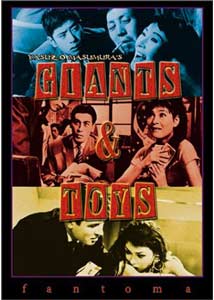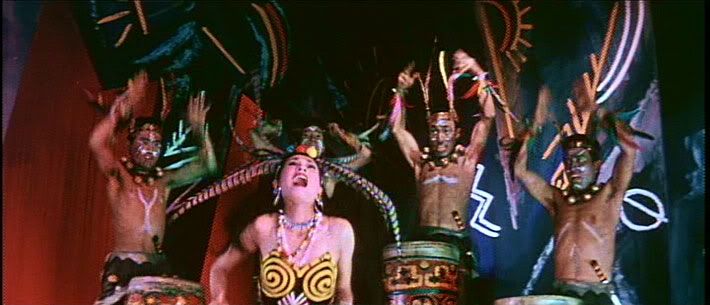The other problem is that, unless you stop watching films altogether, your list of favourites is always subject to change. You're unlikely to fall out of love with your Top 10 or 20 or so, but there's always the chance that something new is going to arrive on the scene, displacing something from the lower reaches of the Top 100, threatening to work its way up through repeated viewings, old favourites being shunted aside.
 So it was almost inevitable that, as soon as I'd sent off my votes to Cinema Fusion, something new would catch my eye. And that something turned out to be Kyojo to gangu, aka Giants and Toys (Yasuzo Masumura, 1958). The blunt plot details make it sound distinctly unpromising: the film's about the marketing war between three rival candy manufacturers, and the human fall-out from their increasingly cynical tactics. But in among the trite jingles and sickly caramels is a hard-edged two-fister of a movie, peppered with bizarre stylistic quirks and interludes that serve to remind you that this Japan, and in Japan, they tend to do things a wee bit differently.
So it was almost inevitable that, as soon as I'd sent off my votes to Cinema Fusion, something new would catch my eye. And that something turned out to be Kyojo to gangu, aka Giants and Toys (Yasuzo Masumura, 1958). The blunt plot details make it sound distinctly unpromising: the film's about the marketing war between three rival candy manufacturers, and the human fall-out from their increasingly cynical tactics. But in among the trite jingles and sickly caramels is a hard-edged two-fister of a movie, peppered with bizarre stylistic quirks and interludes that serve to remind you that this Japan, and in Japan, they tend to do things a wee bit differently.Goda (Hideo Takamatsu) is a marketing manager for the World company, tasked with increasing sales of caramels. Accompanied by his underling Nishi (Hiroshi Kawaguchi), he finds a gawky unknown to front a new campaign. Tadpole-loving tomboy Kyoko (Hitomi Nozoe) is blessed with "vivacious eyes and a long tongue", but cursed with rotten teeth, although this doesn't seem to affect her popularity with the sweetie-scoffing public, and she soon becomes a multimedia sensation.
Of course, it can't last, and the cracks are starting to show in the World showroom, as Goda's cynical tactics and contempt for the customers help him to elbow aside his old-fashioned boss (and, just to rub in the Oedipal overtones, father-in-law) Yashiro. But this is more than a simple moral fable about the black heart of big business. Yashiro makes one last attempt to rein in his son-in-law's excesses by appealing to the ancient Japanese codes of honour. "We're not samurai," sneers Goda.
You see, Giants and Toys is about far more than the ills of capitalism. It was made only 13 years after the end of World War II, and all three companies seem to vie with each other to rebuild Japan in the model of the victorious Americans. Rock 'n' roll, James Dean and toy ray-guns are deployed to appeal to the kids, for whom Yashiro's code of bushido holds no attraction. A trio of disabled war veterans sing for pennies on the sidewalk, ignored by everyone. Sweet bumpkin Kyoko gets her teeth fixed and ends up performing a bizarre, pseudo-tropical nightclub dance routine, looking like a low-rent Maria Montez. It's a wryly conservative critique of the direction that contemporary Japanese society was taking.
 Which in turn makes it all the more ironic that Masumura takes so much from American movies. Not only does the Pygmalion-esque plot owe a heavy debt to Will Success Spoil Rock Hunter?, but the relationship between the brutal Goda and the resentful but subservient Nishi echoes that between Burt Lancaster and Tony Curtis in Sweet Smell of Success - both Hollywood classics were released in 1957, the year before Giants and Toys.
Which in turn makes it all the more ironic that Masumura takes so much from American movies. Not only does the Pygmalion-esque plot owe a heavy debt to Will Success Spoil Rock Hunter?, but the relationship between the brutal Goda and the resentful but subservient Nishi echoes that between Burt Lancaster and Tony Curtis in Sweet Smell of Success - both Hollywood classics were released in 1957, the year before Giants and Toys. But at the same time it's emphatically Japanese. There's a thread of camp hysteria that runs through a lot of Japanese films in the late '50s and '60s - think of the bizarre thrillers of Seijun Suzuki - and a penchant for symbolism that would seem heavy-handed in a Western context. So Goda, even as he rises through the ranks, can never get his cigarette lighter to spark without repeated efforts, hinting at his lack of warmth and humanity, and maybe something more; he mentions that his wife is infertile, but the suspicion remains that he's the one to blame.
In the end, there are no winners, as capitalism destroys opponents and champions alike. Nishi endures the humiliation of touting his wares along a Tokyo street, dressed as a comic, gun-toting astronaut. Yashiro is sidelined by an ulcer; Goda, propped up on a diet of pep-pills, coughs blood over the letter confirming his promotion. Even Kyoko's tadpoles die.
It's true. Too many sweets make you sick.
4 comments:
Totally off topic, but I had no idea until now that you were the author of a book concerning Radiohead. I intend to read it. You have my utmost respect sir.
Thank you, Kieran, and I hope the respect thing holds up throughout the arduous reading process.
I feel a bit guilty about Japanese cinema (and most of European cinema too) as I was a film student, yet we never bothered with the rest of the world, only England & America. How come you know so much about Japanese films? What else would you recommend then?
(PS last Japanese film which I saw, which blew me away, was The Twilight Samurai - very atypical war movie, about a reluctant widower Samurai who'd rather stay home and look after his daughters.)
Don't actually know that much; just like that slightly hyperreal attitude that pervades in a lot of Japanese cinema. Lots of intense acting and set pieces in superficially 'normal' environments.
Five picks: Tampopo (Juzo Itami, 1985); The Hidden Fortress (Akira Kurosawa, 1958); Tokyo Drifter (Seijun Suzuki, 1966); Zatoichi (Takeshi Kitano, 2003); Tokyo Story (Yasujiro Ozu, 1953). Will check out Twilight Samurai, sounds intriguing.
Post a Comment